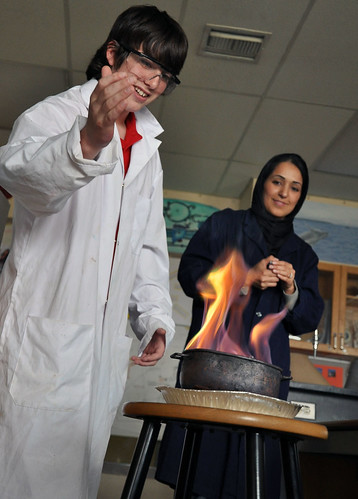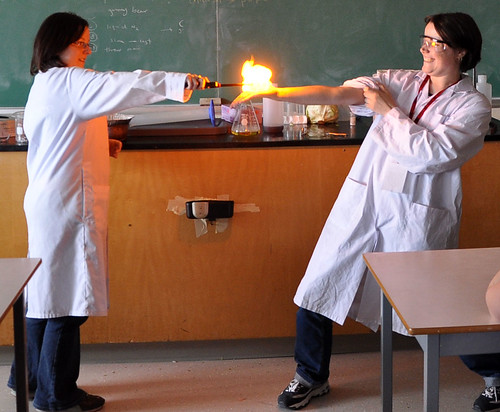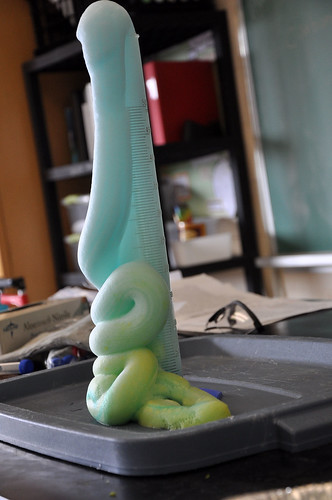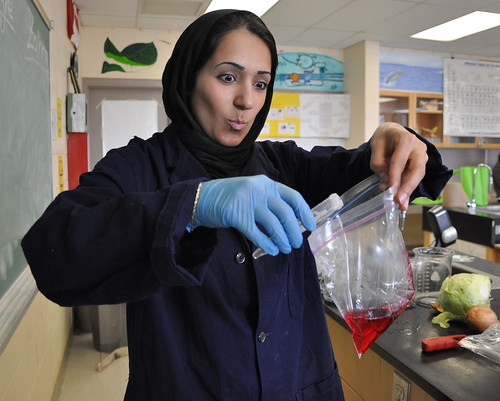I finally got to do a really, really cool Let's Talk Science activity at my old high school with my partners Zahra and Carolyne. It was a chemistry magic show, where we played with everything from slime to fire to liquid nitrogen. Oh yes, and we taught them some chemistry on the way.
Here's me in 'mad scientist' mode, posing with the Evil Scientist Brew made with dish soap, sodium hydroxide, universal indicator, and dry ice. The dry ice creates the 'smoke' and acidifies the solution, eventually changing its colour.
The fire comes after playing a trick on one poor, unsuspecting student. We asked him to mix together two solutions for us into a homogeneous solution. Much to his dismay, though, a solid is created! We ask him to fix his 'mistake' by burning (and thus melting) it, but it turns out that doesn't work either because what we've actually made it Sterno.
So once we have our fire going, we throw in various metals to get pretty colours.
I had a lot of fun demonstrating the fast burning nature of gun cotton...
...and the students loved our elephant's toothpaste...
There are many more photos of these 'experiments' and others (like 'death to the gummy bear') available on my Chemistry Magic Show Flickr set (all photos that I'm not in were taken by me).
While this isn't exactly computer science outreach, it does show how much fun outreach can be!
Tuesday, April 28, 2009
Sunday, April 26, 2009
CRA-W Grad Cohort: Balancing Graduate School and Life
Balancing school with life. This is a topic that comes up all the time for women in science and engineering - it seems to be something we all struggle with. I guess that's why it was the focus of one of the last keynote talks at the CRA-W Grad Cohort. Here's my summary of the useful advice given to us by two wonderful women with different ways of working toward that seemingly elusive balance we all seek.
The first suggestion is to prioritize your work and your responsibilities. If you have to work to earn a living while going for your PhD part time, for example, you should never let school get in the way of your employment! Having said that, it doesn't hurt to work harder than you have ever worked before, because it won't last forever and it will be so worth it.
You should try to set yourself short, deliverable goals. I've learned that this isn't easy from own experience - I wanted to make milestones during my Masters, but never nailed them down. It can sometimes help to ask yourself not just what your goals are, but why you have them. Did you set your goals for yourself? Or do you just want others to think highly of you? This might help evaluate the priority of each goal. Also remember to celebrate when you achieve any goal, big or small, be it a dinner out or a few hours of soaps.
Don't be afraid to ask questions when it gets hard (you'll be worse off not having a good answer, even if you embarass yourself asking). Find mentors among your colleagues and friends, since you might feel more comfortable asking them for help. And try not to panic - there is always a solution!
An interesting idea is to sign a contract with your significant other, should you have one, before you get going on your Masters or PhD. This way they know what to expect and how hard things will be. You may also agree on what kind of chores or childcare duties will become very hard for you to take care of, and what things you promise to try to do.
Remember that nobody can maintain an insane pace forever. Sure, we can do it in bursts, but we need breaks, or else we'll burn out! I always tell new students to make sure they take breaks to go for a walk, talk with friends, hang out outside... anything to get your eyes off a screen. It can be really hard to shake the guilt that you aren't working on your research, but let's face it - the time spent recharging your mind will be paid back tenfold in the newfound productivity when you get back to work.
We all have insecurities, and the darned things can really get in the way of accomplishing our goals! The best thing to do is be honest with yourself so you can move past them. Setting up a positive feedback file, where you keep all the nice notes and emails people have sent you over the years, can give you a happy place to spend a few minutes when you're feeling down.
A few parting tips given to us:
The first suggestion is to prioritize your work and your responsibilities. If you have to work to earn a living while going for your PhD part time, for example, you should never let school get in the way of your employment! Having said that, it doesn't hurt to work harder than you have ever worked before, because it won't last forever and it will be so worth it.
You should try to set yourself short, deliverable goals. I've learned that this isn't easy from own experience - I wanted to make milestones during my Masters, but never nailed them down. It can sometimes help to ask yourself not just what your goals are, but why you have them. Did you set your goals for yourself? Or do you just want others to think highly of you? This might help evaluate the priority of each goal. Also remember to celebrate when you achieve any goal, big or small, be it a dinner out or a few hours of soaps.
Don't be afraid to ask questions when it gets hard (you'll be worse off not having a good answer, even if you embarass yourself asking). Find mentors among your colleagues and friends, since you might feel more comfortable asking them for help. And try not to panic - there is always a solution!
An interesting idea is to sign a contract with your significant other, should you have one, before you get going on your Masters or PhD. This way they know what to expect and how hard things will be. You may also agree on what kind of chores or childcare duties will become very hard for you to take care of, and what things you promise to try to do.
Remember that nobody can maintain an insane pace forever. Sure, we can do it in bursts, but we need breaks, or else we'll burn out! I always tell new students to make sure they take breaks to go for a walk, talk with friends, hang out outside... anything to get your eyes off a screen. It can be really hard to shake the guilt that you aren't working on your research, but let's face it - the time spent recharging your mind will be paid back tenfold in the newfound productivity when you get back to work.
We all have insecurities, and the darned things can really get in the way of accomplishing our goals! The best thing to do is be honest with yourself so you can move past them. Setting up a positive feedback file, where you keep all the nice notes and emails people have sent you over the years, can give you a happy place to spend a few minutes when you're feeling down.
A few parting tips given to us:
- Remember to schedule in play time.
- Remember to take care of yourself (exercise, sleep well, eat well).
- Apply extra money to buy housekeeping, babysitting, etc if possible.
- Maintain your friendships and don't isolate yourself!
- Getting a PhD is work - but you have to work on your life too!
Wednesday, April 22, 2009
MangoBunnies in Imagine Cup Finals
Many attendees of the Grace Hopper Celebration of Women in Computing had the pleasure of meeting Ed and Ashley. They were volunteer videographers and captured highlights of the entire conference, including hellos from organizers, volunteers, and delegates like me! One of the videos that I ended up being in along with my CU-WISE colleagues appears on this post I wrote about networking.
This dynamic duo entered into Microsoft's Imagine Cup competition with their colleague Malisa, giving themselves the fun team name of MangoBunnies. They've made it to the finals, and have a really good chance of taking the peoples' choice award! But they need people like you to vote for them.
This is especially exciting since it's the first all-women's team to make the finals in the US, according Mary-Jo Foley of Microsoft. Congrats ladies!
This dynamic duo entered into Microsoft's Imagine Cup competition with their colleague Malisa, giving themselves the fun team name of MangoBunnies. They've made it to the finals, and have a really good chance of taking the peoples' choice award! But they need people like you to vote for them.
This is especially exciting since it's the first all-women's team to make the finals in the US, according Mary-Jo Foley of Microsoft. Congrats ladies!
Wednesday, April 15, 2009
CRA-W Grad Cohort: Being a Woman in Technology
One of the keynote talks at the CRA-W Grad Cohort was a little more female-specific than some of the others. It discussed some delicate situations that often arise more often among women in computing than men. It struck just the right balance between humour and frank seriousness, making it informative and enjoyable. Here are some of my favourite scenarios brought up...
The first situation involves the men in your research group belittling you, interrupting you, and so on; all the while, the supervisor is oblivious to the problem. Some of the more obvious advice includes "putting it on paper" so you can bring concrete examples to those in charge later on, and learning to be strong enough to support and argue for your ideas without getting emotional. I personally rather enjoyed the demonstration given by a very strong (what a firecracker!) woman on the panel, in which she glares at the interrupter and says very concretely, "Let me finish." Apparently they stop interrupting after hearing that a few times! Similarly, if your ideas are being poached by the others, you can regain credit by saying something like, "Oh! I'm so glad you agree with me," or, "Wow, you definitely articulated that idea better than me - thanks for that."
Another interesting scenario occurs when the guys go out to, say, the bars (where they may want to check out the women) and don't want to invite you. I haven't encountered this myself; my lab is awesome about having lunches or a Friday beer to which everyone is openly invited. I end up not going that often because I find myself way too busy, but that's my own doing, not the guys in the group! But if you do find yourself in this situation, sometimes just pointing it out is enough to get invited the next time. Just be careful what you wish for - if you ask for something, you'd better darn well follow through and go, even if it means heading to a crowded bar! You can also do your homework, learning about whatever it is that interests the guys and that they assume doesn't interest you. If all else fails, just make your own plans, and then invite them to come!
If you're faced with the assumption that women always organize the non-work events (social events and such), and you don't really want to be in charge every single time, the best thing to do is learn to say no. I know, it can be really hard to do - sometimes these things are just plain fun. You can accept these requests a couple of times to at least prove that you are indeed good at organizing, but do not accept every time, even if you like doing it! There are many other things you need to take care of! A good trick is to invite others to help you out, in effect teaching them how to run these events the next time (without you, of course).
Finally, my favourite: What do you do if you're attracted to your adviser? Don't do it! Apparently it's the "kiss of death for your career!" Granted, if played in exactly the right way (including switching supervisors - maybe even schools - and keeping it a secret until the defence is done), it might work, but really - if it was meant to be, surely it can wait until you graduate? (I'm sure this is easy to say when not in the situation, but if you ever find yourself there, remember that this advice is coming from some very knowledgeable and successful women.)
There were a few more scenarios discussed than I wrote about here. Some are included in this fellow conference-goer's blog post about this talk. If you have a few of your own, share in the comments!
The first situation involves the men in your research group belittling you, interrupting you, and so on; all the while, the supervisor is oblivious to the problem. Some of the more obvious advice includes "putting it on paper" so you can bring concrete examples to those in charge later on, and learning to be strong enough to support and argue for your ideas without getting emotional. I personally rather enjoyed the demonstration given by a very strong (what a firecracker!) woman on the panel, in which she glares at the interrupter and says very concretely, "Let me finish." Apparently they stop interrupting after hearing that a few times! Similarly, if your ideas are being poached by the others, you can regain credit by saying something like, "Oh! I'm so glad you agree with me," or, "Wow, you definitely articulated that idea better than me - thanks for that."
Another interesting scenario occurs when the guys go out to, say, the bars (where they may want to check out the women) and don't want to invite you. I haven't encountered this myself; my lab is awesome about having lunches or a Friday beer to which everyone is openly invited. I end up not going that often because I find myself way too busy, but that's my own doing, not the guys in the group! But if you do find yourself in this situation, sometimes just pointing it out is enough to get invited the next time. Just be careful what you wish for - if you ask for something, you'd better darn well follow through and go, even if it means heading to a crowded bar! You can also do your homework, learning about whatever it is that interests the guys and that they assume doesn't interest you. If all else fails, just make your own plans, and then invite them to come!
If you're faced with the assumption that women always organize the non-work events (social events and such), and you don't really want to be in charge every single time, the best thing to do is learn to say no. I know, it can be really hard to do - sometimes these things are just plain fun. You can accept these requests a couple of times to at least prove that you are indeed good at organizing, but do not accept every time, even if you like doing it! There are many other things you need to take care of! A good trick is to invite others to help you out, in effect teaching them how to run these events the next time (without you, of course).
Finally, my favourite: What do you do if you're attracted to your adviser? Don't do it! Apparently it's the "kiss of death for your career!" Granted, if played in exactly the right way (including switching supervisors - maybe even schools - and keeping it a secret until the defence is done), it might work, but really - if it was meant to be, surely it can wait until you graduate? (I'm sure this is easy to say when not in the situation, but if you ever find yourself there, remember that this advice is coming from some very knowledgeable and successful women.)
There were a few more scenarios discussed than I wrote about here. Some are included in this fellow conference-goer's blog post about this talk. If you have a few of your own, share in the comments!
Thursday, April 9, 2009
My Exam-Time Tips
Originally posted to the CU-WISE blog, and perhaps of interest to some of my readers here.
Most students here at Carleton are writing exams or working on final projects. This is the first April that I'm not doing the same thing - I'm in my second year of my Master's trying to finish my experiments for my thesis instead! But, needless to say, I've done it many times before, and have developed a pretty good system for studying for exams. While everyone learns in different ways, this strategy should work well for anyone in science and engineering, perhaps with some small modifications.
The basic idea is to find a couple of different ways to force yourself to retain the information you learned in your classes.
My first step (and probably where you all should start) is writing what I call a summary sheet. I comb through my own notes and the professor's slides, looking for key information. I write these down on real paper with a real pen, because when using a computer, the temptation to copy/paste is often too high. Plus, the act of thinking about what to write and then physically writing it is actually the first retention technique. It's amazing how much more I know about the course after doing this. It can take a few days if the time is available between exams dates, so don't procrastinate on this.
I sometimes pretend that my summary sheet is a cheat sheet that I can bring in to the exam with me. While I don't set a strict page limit for it, I do pretend there is some arbitrary one. That way I don't rewrite the whole course, but rather summarize most important stuff in my own words and pick out key information. Again, the extra thinking required to do this helps me remember the content.
Ok, so now I have this summary sheet. What's next? Well, this is where you might like to modify my strategy to fit your learning style. At this point, I like to be forced to recall the information verbally by having a friend (or even, say, my dad - they don't need to understand it) look at what I wrote and devise some straightforward questions about it. You may also want to look at it, cover it up, and try repeating it as a more rote way of memorizing the material (this might work better for practicing formulas, too).
After all that, I sleep. It's so important to be well rested for the exam. Even if I'm not done going through the whole course, I know when to stop, because not sleeping enough will be worse than not being able to answer a question or two on the exam. The next morning, I eat a good breakfast, and read over my summary notes one last time. But I just read them - I don't usually try to recite information or do any more memorizing, because that can be stressful (the last thing you need is more stress!).
Finally, I bring some water to the exam, and just relax! Nothing I do after sitting in that chair is going to change anything.
Give this method a try, and once you get the hang of it, you might even like it. ;) Best of luck on all your exams!
Most students here at Carleton are writing exams or working on final projects. This is the first April that I'm not doing the same thing - I'm in my second year of my Master's trying to finish my experiments for my thesis instead! But, needless to say, I've done it many times before, and have developed a pretty good system for studying for exams. While everyone learns in different ways, this strategy should work well for anyone in science and engineering, perhaps with some small modifications.
The basic idea is to find a couple of different ways to force yourself to retain the information you learned in your classes.
My first step (and probably where you all should start) is writing what I call a summary sheet. I comb through my own notes and the professor's slides, looking for key information. I write these down on real paper with a real pen, because when using a computer, the temptation to copy/paste is often too high. Plus, the act of thinking about what to write and then physically writing it is actually the first retention technique. It's amazing how much more I know about the course after doing this. It can take a few days if the time is available between exams dates, so don't procrastinate on this.
I sometimes pretend that my summary sheet is a cheat sheet that I can bring in to the exam with me. While I don't set a strict page limit for it, I do pretend there is some arbitrary one. That way I don't rewrite the whole course, but rather summarize most important stuff in my own words and pick out key information. Again, the extra thinking required to do this helps me remember the content.
Ok, so now I have this summary sheet. What's next? Well, this is where you might like to modify my strategy to fit your learning style. At this point, I like to be forced to recall the information verbally by having a friend (or even, say, my dad - they don't need to understand it) look at what I wrote and devise some straightforward questions about it. You may also want to look at it, cover it up, and try repeating it as a more rote way of memorizing the material (this might work better for practicing formulas, too).
After all that, I sleep. It's so important to be well rested for the exam. Even if I'm not done going through the whole course, I know when to stop, because not sleeping enough will be worse than not being able to answer a question or two on the exam. The next morning, I eat a good breakfast, and read over my summary notes one last time. But I just read them - I don't usually try to recite information or do any more memorizing, because that can be stressful (the last thing you need is more stress!).
Finally, I bring some water to the exam, and just relax! Nothing I do after sitting in that chair is going to change anything.
Give this method a try, and once you get the hang of it, you might even like it. ;) Best of luck on all your exams!
Wednesday, April 8, 2009
AR Game: Pit Strategy
I was discussing some possible PhD research ideas with my advisor-to-be, and games came up several times (he was, after all, hired as part of the game development stream at Carleton's School of Computer Science). I kept coming back to augmented reality as a potential area to focus on, not only because I find it incredibly exciting, but also because it is a relatively inexpensive way to play around with alternate user interfaces.
This video I found really inspires me to continue looking into this potential research area:
It's so slick looking! The video is from Beyond Reality, who say this game is a work in progress. If what we are seeing is a real demo and not a concept, then colour me impressed. I love how the 3D models pop out of the cards after just the right amount of delay, and the way weather is portrayed. This kind of game will be especially cool when AR glasses become more commonplace.
This video I found really inspires me to continue looking into this potential research area:
It's so slick looking! The video is from Beyond Reality, who say this game is a work in progress. If what we are seeing is a real demo and not a concept, then colour me impressed. I love how the 3D models pop out of the cards after just the right amount of delay, and the way weather is portrayed. This kind of game will be especially cool when AR glasses become more commonplace.
Tuesday, April 7, 2009
The Fundamental Matrix Song
After switching from C++ and OpenCV for my thesis experiment implementation, I was looking for some solid fundamental matrix code for Matlab. I came across this set by Peter Kovesi, which seems to be fairly good. While there, however, I came across something even better - a link to the Fundamental Matrix Song. This is for anyone and everyone who's ever worked with epipolar geometry or just wants to know a little more about it:
Sunday, April 5, 2009
How to Write a Thesis
I'm finally getting down to diving into writing up my Master's dissertation, even though I don't quite have all the results I need yet (yeah, I'm slow, but it's totally been worth it). I have been searching around the 'net for some advice and ideas that will hopefully get me in the mood, if nothing else. Here are some of the links that I found most useful:
- How To Write a Dissertation from Purdue University; especially useful for its list of words to avoid and other grammar tips
- How Theses Get Written: Some Cool Tips from the University of Toronto; includes great tips for getting started early (which I didn't do this time around, but will for the PhD!), and gives great insight into the process from the examiner's point of view.
- Resources for Thesis Students from the University of Aukland; while not an article about how to write a thesis, this page has many valuable resources in addition to thesis-writing links (beware: many are, unfortunately, dead links!).
- How to Write a PhD Thesis from University of New South Wales; though this one isn't specific to computer science, it is still relevant. You should read the section called Personal, about halfway down - it makes some suggestions about keeping yourself in good mental and physical condition while spending many hours working on your writing.
- Writing and Presenting Your Thesis or Dissertation from Michigan State University; this one is long and detailed, so I didn't read through it all, but it looks promising.
Saturday, April 4, 2009
CRA-W Grad Cohort: PhD Academic Career Paths
The second talk I attended at the CRA-W Grad Cohort was technically intended for third year grad students closer to the end of their PhD, but I sat in anyway. I wanted to learn more about academic positions, both to see what was different between Canada and the US, and to confirm whether I really did want to be a teacher rather than a professor.
If I wanted to be a professor, I would have to engage in research, described by the presenters as taking part in some kind of scientific discovery. I would also have to supervise both graduate and undergraduate students, as well as continuously apply for various sources of funding. It's not that these things are particularly unappealing to me (after all, I am planning to do a PhD!). I just feel that I've really clicked with teaching, so I would like to concentrate on that, and stick to research related to education and curriculum issues.
As for the teaching part of any position (professor, instructor, whatever), one would be required to actively and effectively mentor and advise students. All positions also take part it some kind of service at the departmental, university, or even professional development level. Service might include sitting on various committees, taking part in recruitment, or helping organize conferences.
After learning about the different kinds of universities in the States, it turns out that the best possible place for me would probably be a small liberal arts college. These schools grant only Bachelor degrees, and have a strong emphasis on teaching, scholarship, and service. I'm not even sure if these exist in Canada, though, since most universities I've heard of do have graduate programs of some sort (if anyone knows otherwise, let me know!).
In such a teaching-oriented institution, some of the expectations would be to:
The last bit of advice for those who want any type of academic position is to realize that you are in the wrong place if you don't want to teach at all (that is, you care only about the research). So try it out ahead of time to see if you can/want to do it! Teach during grad school, even if you don't have to. Volunteer for things like WISE, conferences, and committees. Maybe even look for programs like the Certificate in Teaching Skills that Carleton offers (I'm almost finished this one myself). But whatever you do, don't go into a professorial position thinking that the teaching isn't important. It's not fair to anyone.
If I wanted to be a professor, I would have to engage in research, described by the presenters as taking part in some kind of scientific discovery. I would also have to supervise both graduate and undergraduate students, as well as continuously apply for various sources of funding. It's not that these things are particularly unappealing to me (after all, I am planning to do a PhD!). I just feel that I've really clicked with teaching, so I would like to concentrate on that, and stick to research related to education and curriculum issues.
As for the teaching part of any position (professor, instructor, whatever), one would be required to actively and effectively mentor and advise students. All positions also take part it some kind of service at the departmental, university, or even professional development level. Service might include sitting on various committees, taking part in recruitment, or helping organize conferences.
After learning about the different kinds of universities in the States, it turns out that the best possible place for me would probably be a small liberal arts college. These schools grant only Bachelor degrees, and have a strong emphasis on teaching, scholarship, and service. I'm not even sure if these exist in Canada, though, since most universities I've heard of do have graduate programs of some sort (if anyone knows otherwise, let me know!).
In such a teaching-oriented institution, some of the expectations would be to:
- Research education methods
- Develop teaching skills
- Attend professional conferences and workshops
- Publish papers in, for example, ACM's Special Interest Group for Computer Science Education (SIGCSE)
- Work with professional organizations (such as CRA-W)
- Collaborate!
The last bit of advice for those who want any type of academic position is to realize that you are in the wrong place if you don't want to teach at all (that is, you care only about the research). So try it out ahead of time to see if you can/want to do it! Teach during grad school, even if you don't have to. Volunteer for things like WISE, conferences, and committees. Maybe even look for programs like the Certificate in Teaching Skills that Carleton offers (I'm almost finished this one myself). But whatever you do, don't go into a professorial position thinking that the teaching isn't important. It's not fair to anyone.
Subscribe to:
Comments (Atom)







